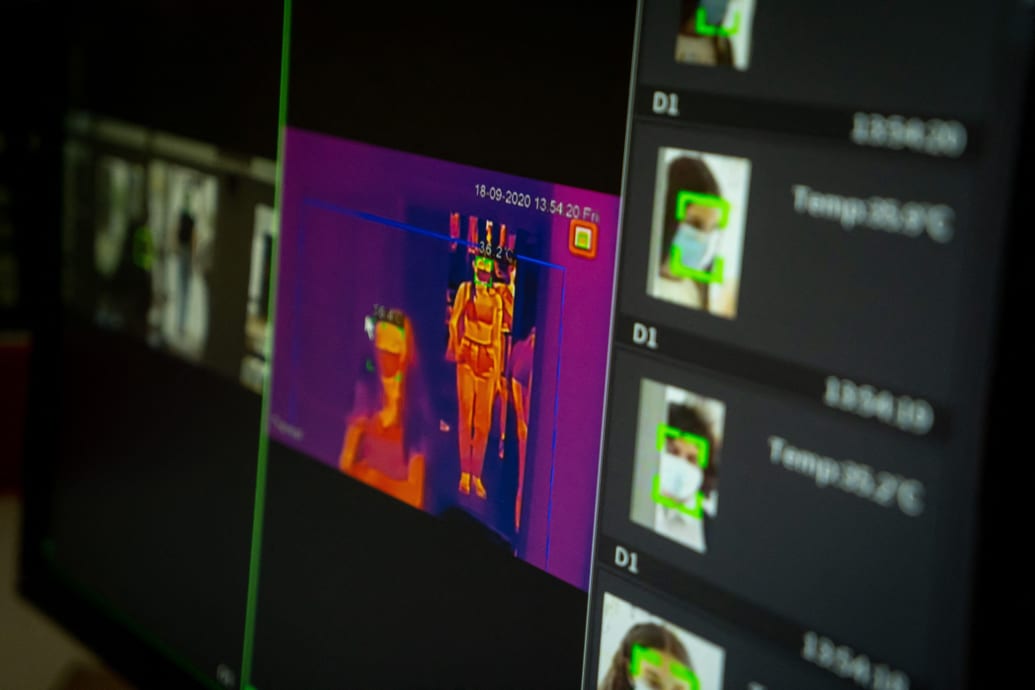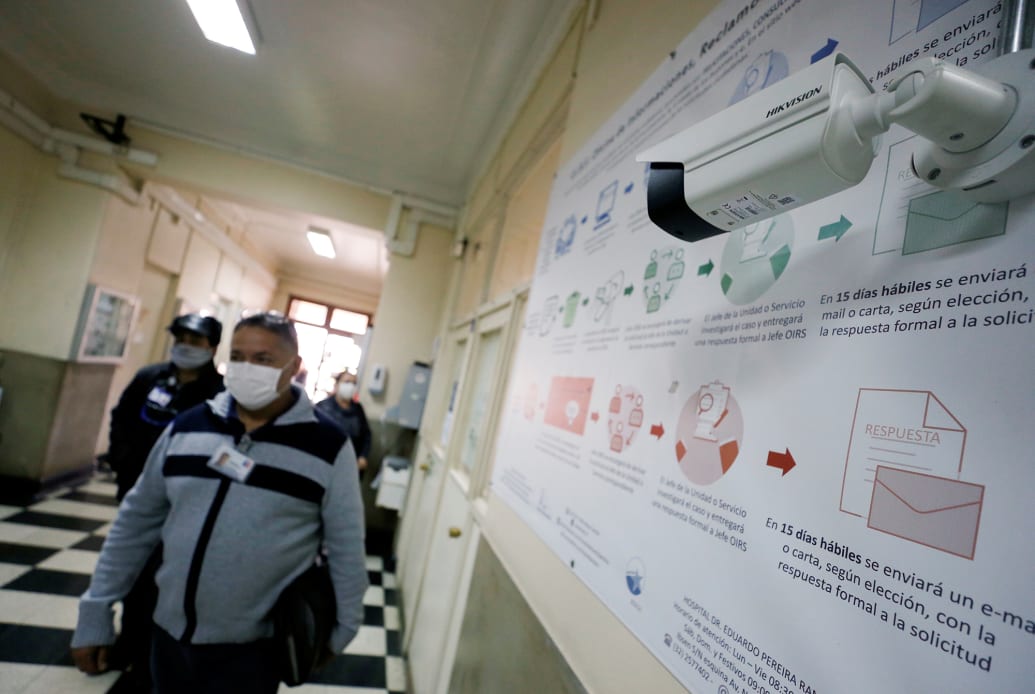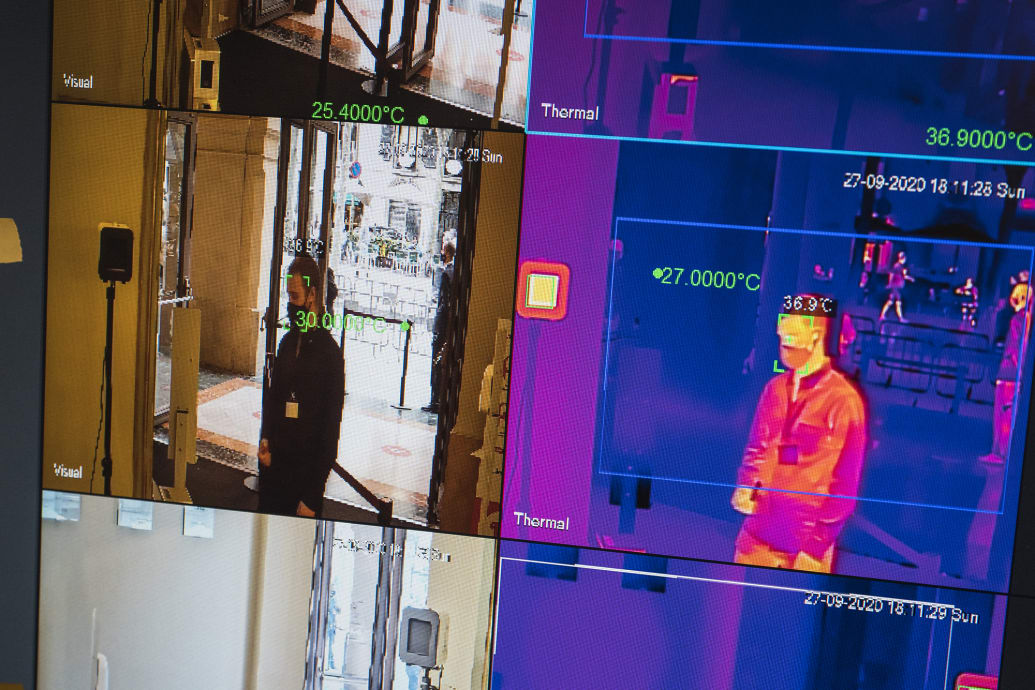In August 2020, with COVID-19 outbreaks proliferating and back to school plans shifting, U.S. tech vendors popped up, promising a solution. They were selling thermal imaging cameras and scanners that they said could screen large groups of students for virus-related fevers in real time. The catch: they didn’t work.
The Daily Beast has found over 200 school districts nationwide that were persuaded to buy these devices between 2020-21 by a number of companies, spending a combined total of more than $11 million. Internal emails obtained through public record requests show how districts were sold technology by an industry which experts compare to the “wild west,” and how now in many instances, the scanners sit dormant in schools, gathering dust.
In the first two years of the pandemic, Congress passed three COVID relief packages totaling $190 billion in aid for education systems. But schools were given little guidance on how to effectively use the money to keep their students safe. Instead, they frantically bought up whatever technology they were told could keep their doors open.
“Districts were really in the dark about what to do,” said Marguerite Roza, director of Edunomics Lab, a research center at Georgetown University. “They were just on the phone, trying to buy buy buy.”
Companies came out of the woodwork, ready to make a pandemic profit. X.Labs, run by a former fugitive and fraudster wanted in South Africa, and SafeCheck USA, started by two Miami real estate brothers who describe themselves as “power agents,” convinced schools to spend millions of federal funds on devices.
They were far from the only vendors drumming up business. The Gananda Central School District in upstate New York was one of many that bought the COVID sales pitch. Superintendent Shawn Van Scoy told The Daily Beast that in a moment of crisis, the district was desperate to solve a problem. In August 2020, the state had introduced mandatory daily temperature testing to catch fevers associated with the virus. But the district had just three nurses for nearly 1,000 students to perform the job.

Pupils go through a thermal scanner before entering their school in Bucharest, Romania.
Andrei Pungovschi
Gananda opted for Hikvision cameras sold by Lantek Security & Automation, a New York-based company, installing two each at their high school and elementary school, and one at their middle school—at a cost of more than $30,000. They also purchased a facial recognition and temperature reader for their transportation department to check employees entering buildings.
The devices appeared to be successful, as long as you hadn’t caught too much sun in the playground or weren’t carrying your morning coffee.
“A few false alarms each day…” wrote Van Scoy on Oct. 13, 2020, in emails, “mostly people coming in after being outside in direct sunlight or carrying hot coffee.”
The trajectory did not improve. Van Scoy said that in the last school year, the devices only detected two fevers, and he can’t recall if they were virus-related. And while a high temperature is a common symptom of COVID-19, you can be infected without one, especially in the first few days. Gananda finally gave up using the scanners in May, as the warmer weather started to cause even more faulty results.
Hikvision, a company half-owned by the Chinese state, has been widely condemned for supplying cameras for an intelligence program aimed at tracking and detaining the Uyghur population in China. In May of this year, it was reported that the U.S. was moving towards imposing sanctions on Hikvision for human rights abuses, which would be the first of its kind on a Chinese company. The company—along with surveillance manufacturer Dahua, another partly Chinese state-owned surveillance manufacturer whose thermal cameras are in U.S. schools—was banned from use by U.S. federal agencies in 2018 and blacklisted by the Department of Commerce in 2019.
Lantek Security & Automation, a New York-based company that pitched the Hikvision devices to Gananda back in July 2020, told the district that the federal pushback was of little concern. “The ‘ban’ is a result of the trade war between the U.S. and China,” wrote Peter Luger, the company’s Business Development Manager, in an email. Lantek declined to comment.
In a statement to The Daily Beast, Hikvision said that the company “is focused on selling to distribution partners and integrators, or installation companies, which means that in most instances, the company does not know where our products are ultimately installed.” Dahua also said it does not sell directly to end-user customers in the U.S.
Yet Hikvision seemed pretty active in making sure the scanners reached Gananda schools. Following Lantek’s email, a Hikvision sales manager reiterated that the ban was nothing to worry about. “This is an unfortunate result of U.S. China relations,” wrote then sales manager Kevin McKay.
Hikvision said its devices were “designed for the detection of skin-surface temperatures so as to achieve rapid preliminary screening in public areas. Actual core body temperatures should ultimately be further confirmed using clinical measurement devices.”
Gananda wasn’t the only school district that now regrets buying Hikvision’s devices. Internal records and conversations that The Daily Beast had with districts show a handful of schools from New York to Wyoming are no longer using the devices, and have put them away in storage.

A Hikvision camera inside a public hospital in Valparaiso, Chile.
Rodrigo Garrido
The Fayette County Public Schools District in north central Georgia spent nearly $500,000 dollars on Hikvision cameras for its 40,000 student population—which ended up being used for only a year. In internal emails from earlier this year, Chief Financial Officer Thomas Gray wrote that “the camera issue was egg on our faces.”
According to district emails, while they were in use, the devices were marred by inaccuracies and fierce community backlash. In October 2020 the scanners were producing a lot of “false positives,” prompting a member of the education board to suggest they “should get a refund.” In a July 2021 public board meeting parents expressed their dismay. “We truly wasted $500,000 of our tax money,” Gail Drouillard, a community member, said. Fayette eventually disabled the devices one month later. The school district did not respond to repeated requests for comment.
A recent study of the widely used scanners found that that the devices distort the results in a way that can overlook a fever—the main symptom of COVID-19 they promised to catch. Many of the devices use software that manipulates temperature readings to make a feverish person appear well. “Even when the devices work, they don’t actually work,” said Conor Healy, a surveillance expert at IPVM and lead researcher of the study. “It’s like a random number generator.”
In a statement, the U.S. Food and Drug Administration agreed that thermal imaging “is not effective at determining if someone has COVID-19 and should not be used to identify/diagnose individuals that have COVID-19.” The agency did alert the public about the improper use of thermal devices in March 2021, but this came a little too late. And while it also issued warning letters to more than a dozen companies for improper marketing of fever cameras, many others continued to persuade schools to buy their technology.
The global thermal imaging camera market captured all sectors in the fight against the coronavirus. It was valued at $3.16 billion in 2020, and is expected to grow by further $1 billion in the next four years, partly driven by increased use of these cameras for security and surveillance. Albert Cahn, Executive Director of the Surveillance Technology Oversight Project, said the U.S. tech sector saw the pandemic as a chance to rebrand. “It seems to be that surveillance companies will constantly pivot to sell their software as a solution to whatever we fear most,” he said. “Never actually providing any evidence that it works.”
Barry Oberholzer, the founder of X.Labs, as well as a former professional rugby player and alleged intelligence operative, has a track record of advertising the latest high-tech software that promises protection from the latest calamity. Back in February 2019 Oberholzer announced “Sword,” a high-tech iPhone case and app he claimed would transform the security industry by allowing people to detect the presence of a gun from their phone.
The following month, The Daily Beast reported that Oberholzer was a fugitive on the run from over two dozen fraud and forgery charges in South Africa. For this story, Oberholzer produced a document to The Daily Beast indicating he was not guilty of any crimes. The South African police did not respond to requests to verify the report.
Oberholzer seized the opportunity to sell thermal scanners to schools as part of California-based company X.Labs. Partnering with Shooter Detection Systems, a gunshot detection solutions provider, they announced “Feevr,” designed as “a quick and effective AI-based system” for temperature screening with a “proprietary AI face detection algorithm.” According to Feevr’s website—which no longer exists—the product used a thermal imaging camera and AI-based mobile app to create automatic alerts if an individual’s temperature exceeded a predetermined threshold. The Daily Beast has tracked 14 schools that bought these devices.
At around the same time as X.Labs continued selling thermal cameras to schools in 2021, it was reported that Oberhozler had posed as retired four-star U.S. General David Petraeus while pitching “Sword” to venture capital firms. Subsequently he was accused of conspiracy to commit wire and mail fraud by the Southern District of New York. This year has been no quieter. Oberholzer was recently sued for fraud by Unique Logistics, a global freight forwarding company. And according to LA court records from March, X.Labs was forced to pay The National Schools Boards Association over $200,000. X.Labs told The Daily Beast that NSBA never performed its undertakings so the company canceled the agreement. NSBA refused to comment.
Now, with little trace of Feevr, X.Labs has pivoted back to selling weapon detection systems to schools—but not with its former partner Shooter Detection Systems. The company told The Daily Beast it had “a short-lived sales relationship with X.Labs which lasted only a few weeks” and “did not recognize any revenue from the relationship.” X.Labs told The Daily Beast that “a secret service agent” had originally reached out to set up the partnership, and that the contract ended when SDS was sold elsewhere.
Oberholzer told The Daily Beast he left X.Labs in January 2021. He seemingly deleted his Twitter account, in which his bio had stated he was the “founder” of X.Labs, straight after The Daily Beast provided a list of questions about his involvement. A spokesperson for X.Labs said that its devices were deployed and are still being used but declined to say which schools were using them. When asked why there is no mention of Feevr on the company’s website, they said that the market needed “change related to temperature scanning hence the board deciding to focus on other products.”

A view of thermal images as concert attendees walk past thermal imaging scanners in Barcelona, Spain.
Cesc Maymo
SafeCheck USA was another company that sprang up at the start of the pandemic, founded by brothers William and Nathan Kakon who, according to their website, specialize in luxury real estate, and also led a drug rehabilitation center and a cryptocurrency company. SafeCheck advertised walk-through body temperature scanners that could screen up to 70 people per minute. However, the FDA told The Daily Beast that “thermal imaging systems have not been shown to be accurate when used to take the temperature of multiple people at the same time.”
Governmental contractual data indicates that SafeCheck has made nearly $2.2 million in sales across public agencies—of which The Daily Beast has tracked 55 schools. Import records show that the company received shipments from a Chinese company Shenzhen Jinjian Era Technology Co, similarly branded as “SafeAgle.” The company could not be reached for comment.
According to The Daily Beast’s analysis, SafeCheck’s last sale was in August 2021 and its website, like Feevr’s, now appears inactive. SafeCheck and the Kakon brothers did not respond for comment.
For privacy advocates, even more worrying than the wasted millions on devices is the safety risk that some schools created by purchasing cameras with facial recognition technology—and the fact that no one really stopped them.
“They bought something that they didn’t know how to use, they didn’t understand any of the implications of using,” said Stefanie Coyle, deputy director of the Education Policy Center at the New York Civil Liberties Union, “And there was no one to tell them ‘hey, this is a bad idea.’”
It is difficult to gauge how many schools utilized this capability, but some companies advertised this component of their systems as a selling point.
Facial recognition, often included in thermal imaging cameras, has a well-documented history of misidentifying people of color, women and children. There are worrying implications for communities already targeted by law enforcement. Such personal student data can, and has in the past, been shared with other government agencies. The biometric information captured on the cameras can also be a target for hackers or malicious actors. All this, according to Coyle, has potentially “devastating consequences.”
The security of Hikvision and Dahua’s camera software has been compromised in the past, with potential loopholes for malicious hackers to take control of devices remotely. Back in 2021, a researcher found the “highest level of critical vulnerability” on Hikvision devices and Dahua admitted their devices were vulnerable to mass hacking.
Dahua told The Daily Beast that “all internet-connected devices are susceptible to cyber-attacks” and that the company has a “consistent track record of identifying vulnerabilities.” The company said their technology “does not and never has represented any type of threat to U.S. interests.”
In July 2020, New York introduced a moratorium on facial recognition cameras in schools—the first of its kind nationwide—after a school district in Western New York spent $1.4 million of state funds, allocated to improve schools’ technology, on the devices.
However, since then The Daily Beast has uncovered 33 districts in New York that were able to buy thermal scanning products with these capabilities, potentially violating the law. Last month, the NYCLU also uncovered evidence that New York officials are ignoring the law by approving grant applications for schools to purchase biometric surveillance tech, including facial recognition.
“It ended up using a broad definition of biometrics, which honestly rendered it pretty useless,” said Tatiana Rice, policy counsel at the Future of Privacy Forum. “I think because of that a lot of schools just stopped following the law in its entirety.”
The moratorium cannot be lifted until the New York State Education Department issues a report on the risks and benefits of this technology in schools. But surveillance experts told The Daily Beast that so far there has been little progress. And while there are laws in other states that ban facial recognition technology—for example the Biometric Information Privacy Act in Illinois which makes it unlawful for private companies to use this technology to identify and track people without their consent —they don’t include schools or public agencies.
NYSED department officials told The Daily Beast that the agency was “aware that schools may not purchase or utilize biometric technology” and that stakeholder information is currently being gathered as part of the report.
Additionally with little federal regulation, there is a lack of robust oversight on companies’ sales as the industry continues to thrive. “No one’s being held accountable,” said surveillance expert Healy. “There’s a real problem of accountability here on every level.”
Back in Gananda, Superintendent Van Scoy expressed his frustration at feeling caught between a mandate that required him to take the temperature of his students everyday, and the facial recognition moratorium, that limited the technology he could employ to keep COVID at bay.
Now, Gananda, like many others, is struggling to find a way to repurpose its devices.
“Do we take them down and put them in a box?” Van Scoy mused on a phone call with The Daily Beast recently. And despite the little they did to mitigate the virus, he asked, “Do we hold off until we need them again?”
Some public records requests were obtained as part of the Documenting COVID-19 project at Columbia University’s Brown Institute for Media Innovation.